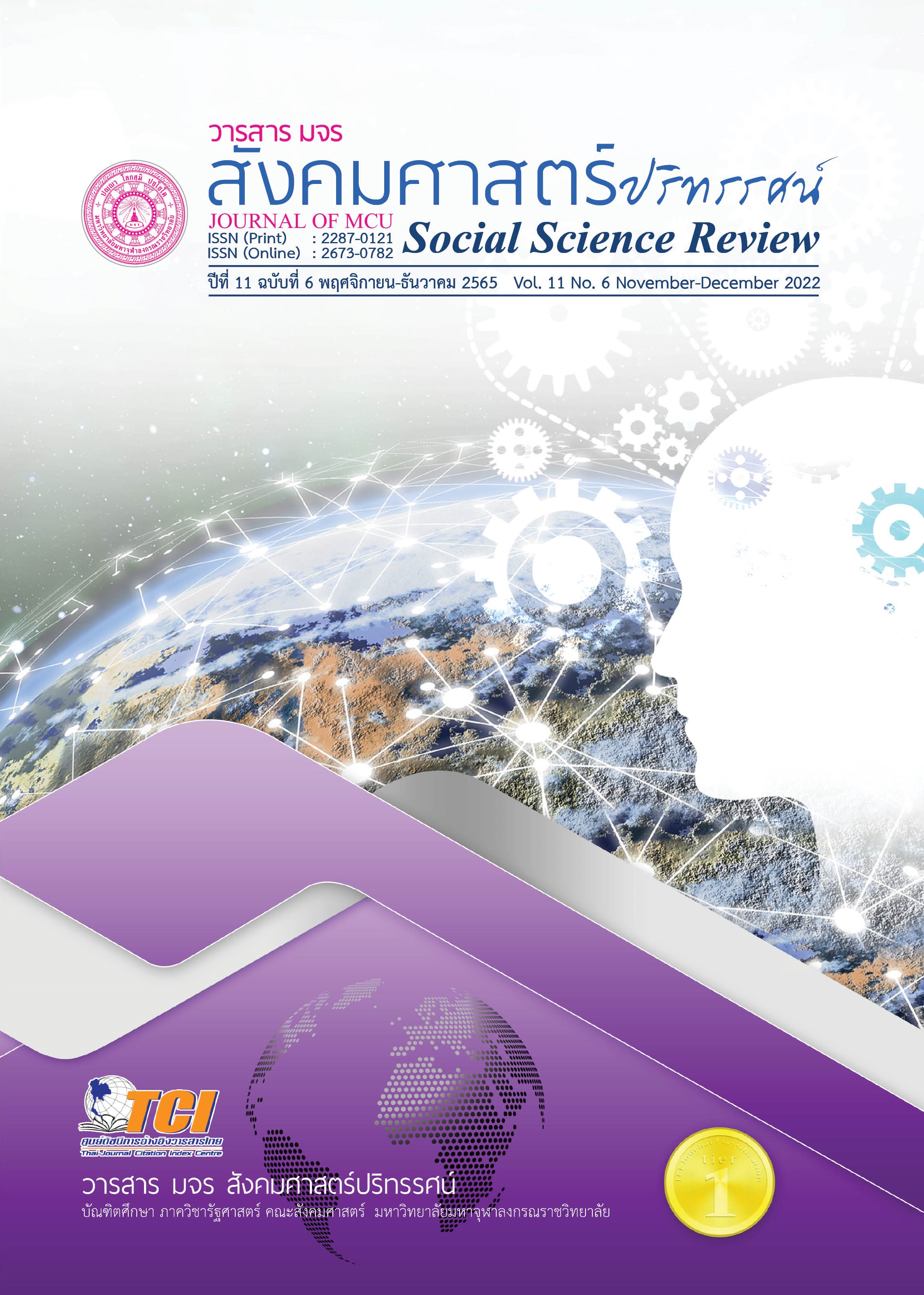การพัฒนานวัตกรรมเพื่อส่งเสริมศักยภาพครูพระสอนศีลธรรมในโรงเรียน จังหวัดเชียงใหม่
คำสำคัญ:
การพัฒนา, นวัตกรรม, การส่งเสริม, ศักยภาพ, ครูพระสอนศีลธรรมบทคัดย่อ
บทความวิจัยนี้มีวัตถุประสงค์ 1) เพื่อวิจัยรูปแบบการพัฒนาศักยภาพ 2) เพื่อพัฒนาเทคนิคและวิธีการสอน 3) เพื่อพัฒนาสื่อและนวัตกรรมการสอนแบบบูรณาการ และ 4) เพื่อวิจัยและพัฒนารูปแบบการสร้างหลักสูตรการสอนศีลธรรมแบบบูรณาการ ศึกษาวิจัยแบบผสมผสาน (เชิงปฏิบัติการและเชิงคุณภาพ) กับกลุ่มประชากรในการวิจัย ได้แก่ 1) ครูพระสอนศีลธรรมในโรงเรียน จำนวน 25 โรง จำนวน 204 รูป 2) กลุ่มเครือข่ายครูพระสอนศีลธรรมในจังหวัดเชียงใหม่ จำนวน 25 รูป 25 โรงเรียน 3) ผู้บริหารโรงเรียน ครูผู้สอน ครูผู้สอนสายสังคมศึกษา จำนวน 25 คน 4) นักเรียนโรงเรียนของอำเภอเมือง อำเภอสันกำแพง อำเภอดอยสะเก็ด จำนวน 25 คน โดยใช้เครื่องมือแบบสัมภาษณ์เชิงลึก
ผลการศึกษา พบว่า 1. รูปแบบการพัฒนาศักยภาพ คือ 1) การพัฒนารูปแบบศักยภาพ 2) การพัฒนาศักยภาพรูปแบบการอบรมเชิงปฏิบัติการ 2. การพัฒนาเทคนิคและวิธีการสอน คือ 1) การออกแบบสร้างชุดความรู้ด้านเทคนิคและวิธีการสอน 2) การสร้างหลักสูตรการฝึกอบรม 3. การพัฒนาสื่อและนวัตกรรมการสอนแบบบูรณาการ อาศัยสื่อระบบปฏิบัติการ (แอพพลิเคชัน) และการ์ตูนภาพเคลื่อนไหว (เอนิเมชั่น) เป็นเครื่องมือในการบูรณาการเนื้อหาการเรียนการสอนในแต่ละชั้น โดยการบูรณาการเรียนการสอนของชั้น (ป.1-2-3) มารวมเป็นช่วงชั้นที่ 1 (ป.4-5-6) เป็นช่วงชั้นที่ 2 และ (ม.1-2-3) เป็นช่วงชั้นที่ 3 4. การพัฒนารูปแบบการสร้างหลักสูตรการสอนศีลธรรมแบบบูรณาการ ได้แก่ หลักสูตรสาระการเรียนรู้ สังคมศึกษา ศาสนาและวัฒนธรรม ในชั้นประถมศึกษา และหลักสูตรหน่วยการเรียนรู้บูรณาการเรื่องหลักธรรมเพื่อพัฒนาชีวิตในช่วงชั้น ม. 2
เอกสารอ้างอิง
กรมการศาสนา กระทรวงวัฒนธรรม. (2563). ระเบียบกรมการศาสนาว่าด้วยการส่งเสริมและสนับสนุนหน่วยเผยแพร่ศีลธรรมทางพระพุทธศาสนา พ.ศ. 2563. กรุงเทพฯ: บริษัท รำไทยเพรส จำกัด.
ดวงกมล สินเพ็ง. (2553). การพัฒนาผู้เรียนสู่สังคมแห่งการเรียนรู้ การจัดการเรียนการสอนที่เน้นผู้เรียนเป็นสำคัญ. กรุงเทพฯ: บริษัท วี.พริ้นท์ จำกัด.
ทิศนา แขมมณี. (2547). ศาสตร์การสอน. กรุงเทพฯ: สำนักพิมพ์จุฬาลงกรณ์มหาวิทยาลัย.
พรรณี ผุดเกตุและคณะ. (2555). รูปแบบการพัฒนาศักยภาพด้านการสอนของพระสอนศีลธรรมในโรงเรียนในจังหวัดสงขลา (หลักสูตรปรัชญาดุษฎีบัณฑิต สาขาวิชาการศึกษาเพื่อการพัฒนาท้องถิ่น). นครศรีธรรมราช: มหาวิทยาลัยราชภัฏนครศรีธรรมราช.
พระครูสุวิชานพัฒนบัณฑิต และคณะ. (2552). ผลสัมฤทธิ์การเรียนโดยพระสอนศีลธรรมในโรงเรียนเขตปกครองคณะพระสงฆ์ภาค 9 (รายงานการวิจัย) ขอนแก่น: มหาวิทยาลัยมหาจุฬาลงกรณราชวิทยาลัย วิทยาเขตขอนแก่น.
พระมหาเกรียงศักดิ์ อินทปญฺโญ และคณะ. (2562). การพัฒนาศักยภาพของพระสอนศีลธรรมในโรงเรียนในจังหวัดลำปาง. วารสารนิติศาสตร์และสังคมท้องถิ่น มหาวิทยาลัยราชภัฏสุราษฎร์ธานี. 3(1), 95 -117.
พูนสุข มาศรังสรรค์. (2554). การจัดการความรุนแรงในครอบครัวเชิงพุทธบุรณาการ. วารสารสันติศึกษาปริทรรศน์ มจร, 4(1), 221-242.
เอื้อมอร ชลวร. (2554). การจัดการความรู้เชิงพุทธบูรณาการ (ดุษฎีนิพนธ์พุทธศาสตรดุษฎีบัณฑิต สาขาวิชาพระพุทธศาสนา). พระนครศรีอยุธยา: มหาวิทยาลัยมหาจุฬาลงกรณราชวิทยาลัย.
ดาวน์โหลด
เผยแพร่แล้ว
รูปแบบการอ้างอิง
ฉบับ
ประเภทบทความ
สัญญาอนุญาต
ลิขสิทธิ์ (c) 2022 วารสาร มจร สังคมศาสตร์ปริทรรศน์

อนุญาตภายใต้เงื่อนไข Creative Commons Attribution-NonCommercial-NoDerivatives 4.0 International License.
เพื่อให้เป็นไปตามกฎหมายลิขสิทธิ์ ผู้นิพนธ์ทุกท่านต้องลงลายมือชื่อในแบบฟอร์มใบมอบลิขสิทธิ์บทความให้แก่วารสารฯ พร้อมกับบทความต้นฉบับที่ได้แก้ไขครั้งสุดท้าย นอกจากนี้ ผู้นิพนธ์ทุกท่านต้องยืนยันว่าบทความต้นฉบับที่ส่งมาตีพิมพ์นั้น ได้ส่งมาตีพิมพ์เฉพาะในวารสาร มจร สังคมศาสตร์ปริทรรศน์ เพียงแห่งเดียวเท่านั้น หากมีการใช้ภาพหรือตารางหรือเนื้อหาอื่นๆ ของผู้นิพนธ์อื่นที่ปรากฏในสิ่งตีพิมพ์อื่นมาแล้ว ผู้นิพนธ์ต้องขออนุญาตเจ้าของลิขสิทธิ์ก่อน พร้อมทั้งแสดงหนังสือที่ได้รับการยินยอมต่อบรรณาธิการ ก่อนที่บทความจะได้รับการตีพิมพ์ หากไม่เป็นไปตามข้อกำหนดเบื้องต้น ทางวารสารจะถอดบทความของท่านออกโดยไม่มีข้อยกเว้นใดๆ ทั้งสิ้น





